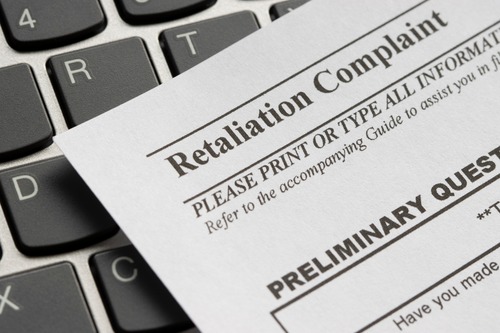At Work Injury Rights, we are dedicated to helping injured workers in Florida get the compensation they deserve. Our experienced team of workers’ compensation attorneys understands the challenges you face and is committed to guiding you through every step of the legal process. We provide personalized attention to each case and fight to protect your rights, whether you’re dealing with an injury, retaliation, or discrimination. If you’ve been hurt on the job, we’re here to help you secure the benefits you need for a full recovery.
Filing a workers’ compensation claim in Florida is your right if you are injured at work, but some employees may face employer retaliation as a result. Retaliation can take many forms, such as job loss, demotion, or other adverse actions that make your work environment hostile. Understanding your legal protections and how to respond if you suspect retaliation is crucial.
In this blog, we will discuss what constitutes employer retaliation after filing a workers’ compensation claim, the legal protections available to you, and the steps you can take to address retaliation, including the importance of working with an experienced Florida workers’ compensation attorney to protect your rights.
What is Employer Retaliation?
Employer retaliation can happen after an employee files a complaint or engages in a protected activity. Retaliation occurs when an employer takes adverse actions against an employee who engages in protected activities, such as filing a complaint or reporting discrimination.
Definition of Employer Retaliation
Employer retaliation happens when an employer takes negative action against a worker for exercising their legal rights. In Florida, this often includes filing a workers’ compensation claim. Retaliation violates both state and federal laws, including Florida Statute § 440.205 and Title VII of the Civil Rights Act. Understanding employment law is crucial for recognizing and addressing employer retaliation.
What Counts as a Protected Activity
Protected activities include actions like reporting workplace injuries, filing for workers’ comp, or complaining about discrimination or harassment. Employees are protected from employer retaliation for participating in these protected activities, even if the complaint is not upheld.
Examples of Retaliation in the Workplace
Employer retaliation can take many forms. Common examples include:
- Firing or demotion
- Pay cuts or denied promotions
- Negative performance reviews without cause
- Excessive micromanagement
- Exclusion from meetings or team activities
- Spreading false rumors
These actions are considered adverse employment actions if they would discourage a reasonable employee from asserting their rights.
Why Employer Retaliation Is Illegal
Laws protect employees to ensure they can report problems without fear. If an employer retaliates after a worker files a valid claim or complaint, they may face legal penalties. Workers can file a retaliation claim with the Equal Employment Opportunity Commission (EEOC) or the Florida Commission on Human Relations. Federal and state law provide robust protections to ensure employees can report issues without fear of retaliation.
Is Retaliation After Filing a Workers’ Comp Claim Illegal in Florida?
Employer retaliation against employees who file workers’ compensation claims is illegal in Florida. Florida law and federal protections ensure workers are shielded from such actions.
Florida Statute § 440.205
Florida Statute § 440.205 explicitly protects employees from retaliation after filing a workers’ compensation claim. It states that no employer shall discharge, threaten to discharge, intimidate, or coerce an employee for filing a claim or attempting to claim workers’ compensation benefits. Violating this law can result in legal consequences for employers.
Link to Florida Statute § 440.205
Federal Protections Under Title VII
In addition to Florida law, federal laws also protect employees from employer retaliation. Title VII of the Civil Rights Act of 1964, for example, prohibits retaliation against employees who file complaints related to workplace discrimination. This protection extends to workers involved in workers’ compensation claims, as discrimination based on workers’ comp participation can fall under retaliation laws.
What a Retaliation Claim Looks Like
Retaliation after filing a workers’ comp claim can take many forms. Common retaliatory actions include demotions, pay cuts, job reassignment, or termination. In some cases, employers may create a hostile work environment through excessive micromanagement or spreading false rumors. These actions are illegal when they occur because of a worker’s involvement in a workers’ comp claim. Employer retaliation often intersects with employment discrimination, where employees are penalized for standing up against unfair practices.
Legal Recourse for Workers
Employees who experience employer retaliation can file complaints with the Florida Commission on Human Relations or the Equal Employment Opportunity Commission (EEOC). Filing a complaint can lead to investigations and, if necessary, legal action against the employer. A worker may also have the right to seek damages for lost wages, emotional distress, and legal fees.
Legal Protections Available to Injured Workers
Injured workers are protected by both state and federal laws. These protections ensure that workers can seek compensation and report injuries without fear of retaliation or discrimination.
Florida Workers’ Compensation Law
Under Florida Statute § 440.205, employees are protected from employer retaliation when filing a workers’ compensation claim. The law specifically prohibits employers from firing, threatening, or discriminating against workers who file for workers’ comp. This protection applies to all workers who experience a job-related injury or illness.
Federal Protections Under the ADA and Title VII
In addition to Florida law, federal laws provide further protections. The Americans with Disabilities Act (ADA) prohibits discrimination against employees with disabilities, including those who file workers’ compensation claims related to work injuries. Similarly, Title VII of the Civil Rights Act of 1964 protects workers from employer retaliation based on race, color, religion, sex, or national origin when they file a workers’ compensation claim.
Retaliation and Discrimination Protections
Both federal and state laws offer protections against employer retaliation for filing a workers’ compensation claim. These protections ensure that workers are not subjected to unfair treatment, such as job termination, reduced hours, or other negative actions. If an employer retaliates, workers have legal recourse to challenge the action. Consulting an experienced employment lawyer can provide essential guidance in navigating these protections and pursuing a retaliation claim.
Legal Options for Injured Workers
If an injured worker faces employer retaliation, they can file a complaint with the Florida Commission on Human Relations or the Equal Employment Opportunity Commission (EEOC). Workers also have the right to pursue legal action, which can result in remedies such as reinstatement, back pay, or compensation for emotional distress.
What to Do If You Suspect Retaliation
If you suspect employer retaliation after filing a workers’ compensation claim, it’s important to take immediate action. The following steps can help protect your rights and build a case against employer retaliation.
Document Everything
Start by keeping a detailed record of all events related to the employer retaliation. Write down any adverse actions taken against you, such as changes in job duties, pay cuts, or negative performance reviews. Include dates, times, and the names of individuals involved. Documentation can provide key evidence if you decide to file a retaliation claim.
Review Your Employee Handbook
Check your employee handbook for company policies regarding employer retaliation. Many businesses have specific procedures for reporting retaliation or discrimination. Understanding these policies can help you navigate your next steps and ensure your complaint follows the proper process.
Report the Retaliation Internally
File a formal complaint with your employer’s human resources department or upper management. Reporting the issue internally gives your employer a chance to address the situation before legal action is necessary. It also establishes a record that you attempted to resolve the issue within the company.
File a Complaint with the EEOC or Florida Commission on Human Relations
If internal reporting doesn’t resolve the issue, file a complaint with the Equal Employment Opportunity Commission (EEOC) or the Florida Commission on Human Relations. Both agencies handle employer retaliation claims and can investigate the situation. The EEOC and Florida Commission also help protect workers from retaliation in connection with workers’ comp claims. Complaints can also be filed for issues such as sexual harassment, which is considered unlawful under certain circumstances.
Consult an Experienced Workers’ Compensation Lawyer
Consider speaking with an experienced workers’ compensation lawyer who specializes in employer retaliation cases. A lawyer can guide you through the legal process, protect your rights, and help determine if you have a case against your employer. Legal counsel is especially helpful in gathering evidence and pursuing compensation if retaliation has occurred.
Contact an Experienced Florida Workers’ Compensation Lawyer Today!
If you believe you are experiencing employer retaliation after filing a workers’ compensation claim, it’s important to take action as soon as possible. At Work Injury Rights, our experienced team of workers’ compensation attorneys is dedicated to protecting your rights and ensuring you receive the compensation you deserve. We understand the challenges you may face and will work closely with you to navigate the legal process, address retaliation, and help you secure a fair outcome.
Contact us at 954-388-8616 for a free case consultation today!








